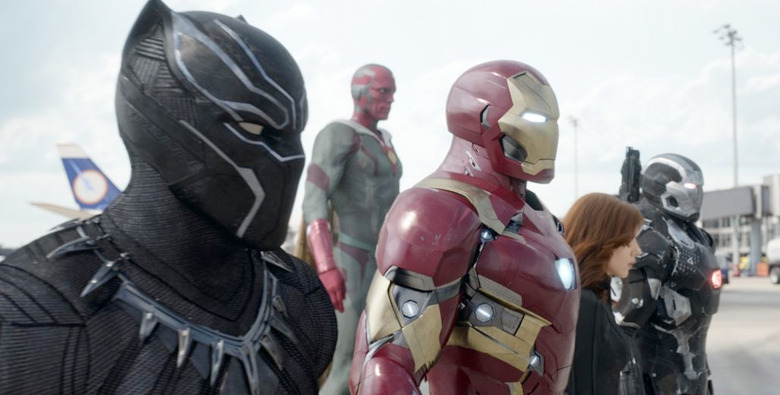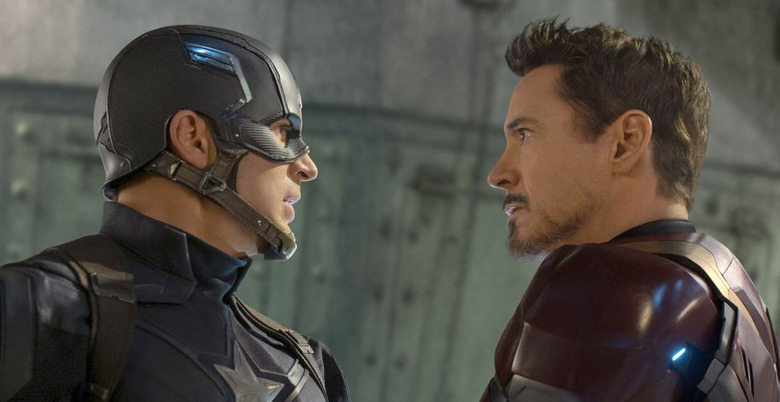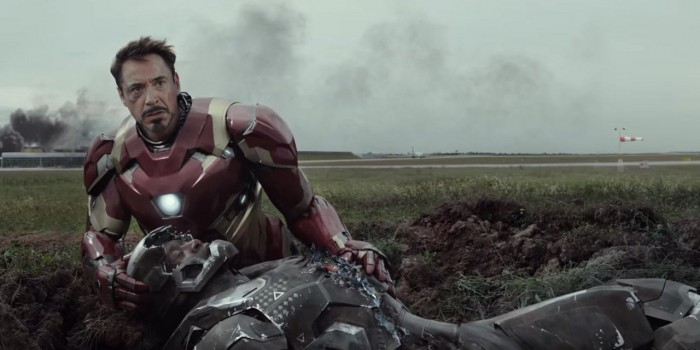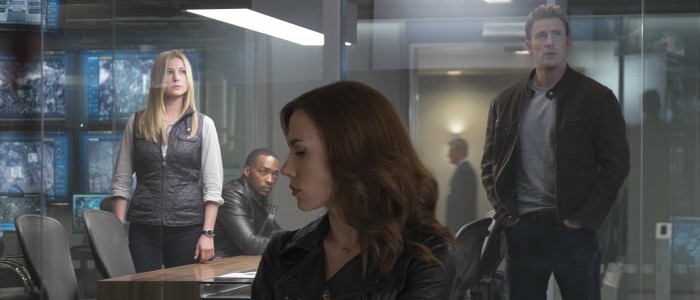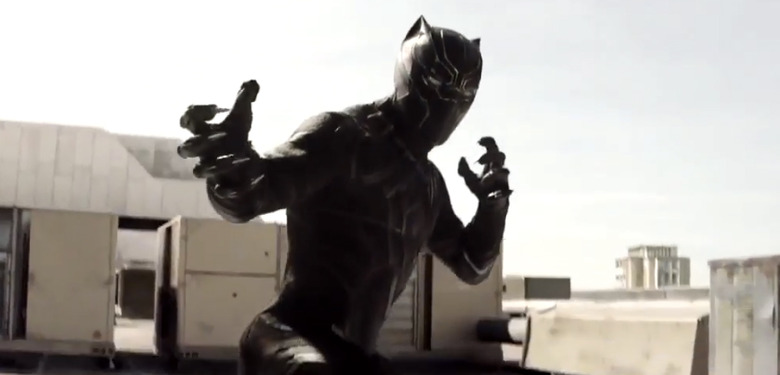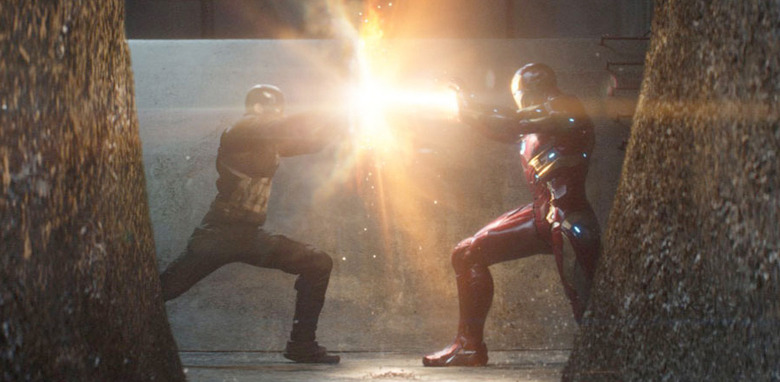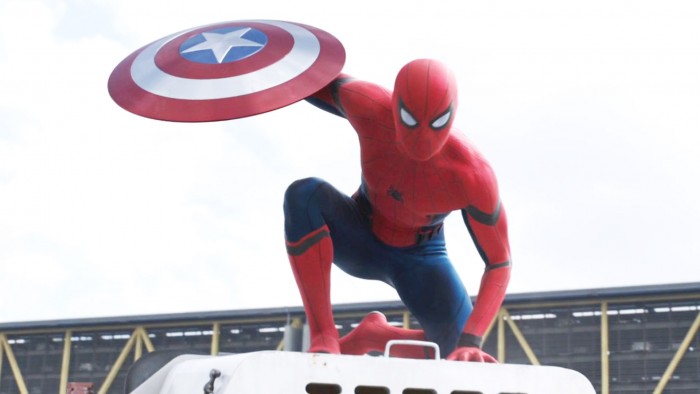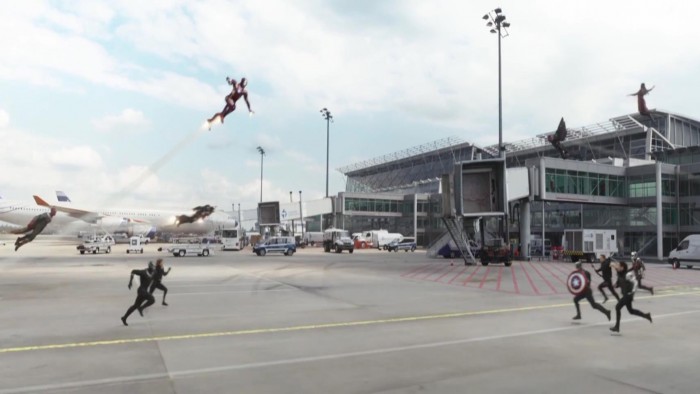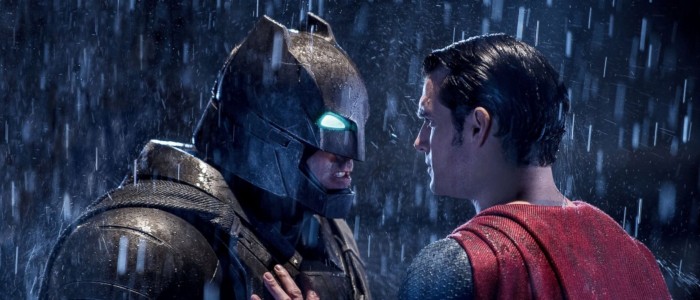'Captain America: Civil War' Spoiler Review: A Closer Look At Marvel's Latest Triumph
If the box office was any indication, you probably saw Captain America: Civil War over the weekend. And how could you not? The thirteenth film in the Marvel Cinematic Universe officially kicked off the summer movie season with a bang, delivering one of the strongest superhero movies yet (which is saying something, considering how many of these things come out every year). And now that we've all had to chance to witness the showdown between Steve Rogers and Tony Stark with our own two eyes, you know what that means – it's time for a spoiler review, where we take a closer look at individual elements of the film and invite you to politely bicker and disagree and converse.
Naturally, spoilers follow. You know what to do.
A Full Plate
The most impressive thing about Captain America: Civil War is how much the film has on its plate and how well it manages to serve every single element on that plate. The film looks like a buffet – busy, crowded, prone to things tasting a little overdone – but it's really a finely honed three course meal. It gets it, does its job, and gets out while never feeling the burden of the sheer amount of stuff it's dealing with. Civil War is a lengthy movie, but it flies.
This is a case where the credit must be given to a number of parties. Screenwriters Christopher Markus and Stephen McFeely were tasked with finding a way for a dozen Avengers and a dozen more allies and enemies to end up tangled in the same web. Directors Joe and Anthony Russo were tasked with finding a way to make each and every one of those characters feel vital to the plot, to let them carry weight alongside the people more central to the conflict at hand. And, of course, the actors themselves (even those with significantly less screen time than their co-stars) make the material sing. The Marvel Studios movies have been accused of being entertainment created by committee, movies crafted by an industrial machine, and that accusation isn't entirely off-base. However, it does ignore how all of those moving parts, all of those smart people sitting around in rooms putting their heads together, have built a machine that gets the job done better than just about anyone else in Hollywood these days.
As its title implies, Captain America: Civil War is a Captain America movie first and foremost (and we'll get to that in a moment). However, it carries the energy of a comic book crossover, telling the broad strokes of the main event and allowing us peeks at the margins, the invisible one-shot tie-ins that fill in the blanks. If this version of Civil War existed on the page, the regular Ant-Man series would take a break from whatever story it was telling to explore how Scott Lang ended up in Berlin. But I digress. The point is that Civil War feels like the best kind of a crossover, the best kind of main event – it brings everyone together for a purpose that is too big for one story and lets this diverse collection of characters bounce off of one another for two hours. That's always been the appeal of Marvel comics, it was the appeal of the Avengers movies, and now, thanks to a cohesive movie universe where audiences understand the dynamics of everyone on screen, it's the appeal of even the solo MCU movies.
The Central Showdown
Although much of the buzz surrounding Captain America: Civil War centered around which heroes were Team Cap and which were Team Iron Man, that choice is actually a relatively minor aspect of the final film. When stripped down to its core, Civil War is really about three men: Steve Rogers, Tony Stark, and the man that divides them, Bucky Barnes. Strip it down further and you're left with a movie that is entirely about Steve Rogers and a series of difficult choices. Tony is a compelling antagonist because we know him so well by this point and because we understand each and every decision he makes, we're forced to challenge the choices made the character whose name is in the title. Here is a superhero movie where the two guys who spend the bulk of the film brawling are completely in the right. Captain America: Civil War doesn't always come down on the side of Captain America.
The greatest trick Civil War pulls is that it allows you to leave the theater and actually discuss whether or not you're Team Cap or Team Iron Man. And that discussion isn't a matter of which side is cooler or which side has collected the better heroes. It's a question of what you genuinely think is right. Since seeing Civil War on Thursday, I've spoken about the choices Steve and Tony make throughout the film and I've encountered a smorgasbord of differing opinions and arguments. Steve Rogers is selfish. Tony Stark is putting his faith in a broken system. Steve values a single friend over the lives of countless innocent people. Tony is letting guilt blind him to the bigger picture. Both sides are right and both sides are wrong. I've had to discuss this film in the context of the "real world" and the context of Marvel Universe, because the same rules don't necessarily apply to both. Civil War is fine popcorn entertainment, but there's meat on the bone. It wants you to question its heroes. It wants you to debate the what it means to be a superhero.
This is a discussion Batman v Superman tried to kickstart a few months ago, but Civil War is more upfront with its intentions, more clear in how it depicts character motivations. By this point, audiences have been through the gamut with Captain America. We've seen him evolve from a good kid to a loyal soldier to man-out-of-time hero to a jaded skeptic. His third solo film, his fifth appearance in the MCU, feels like a climax to his saga thus far. In order to represent what he thinks is right. he can no longer operate within the system. He needs to break it. He needs to become a criminal. Civil War isn't shy about this – the film ends with Cap decimating a representative of the United Nations in a final battle and breaking his buddies out of prison. It's the Robin Hood thing. The Zorro thing. Hell, it's the Batman thing. Sometimes, the law stands in the way of doing the right thing.
Or at least the right thing in Captain America's mind.
A Cast of Dozens
The ensemble of Captain America: Civil War is terrific before you even get to the guys and gals in spandex. As Helmut Zemo, the wonderful Daniel Brühl is one of the best MCU villains in ages, the kind of bad guy whose motivation is so crystal clear, so understandable, and so human that it's hard to argue with his mission. He's about as far from his comic book counterpart as you can get (I miss the purple balaclava, personally), but he's the kind of string-pulling puppet master a movie like this needs. He's not fueled by a desire for power. He just wants justice. Just like Steve Rogers. Just like Tony Stark. And like those two, he's not afraid to break a few eggs to get there. His ending is tragic and worthy of an actor as strong as Brühl. Knowing that he's broken the Avengers' bonds into a thousand pieces, he's perfectly comfortable putting a gun to his head and ending it all. The last-minute intervention of Black Panther ensures that he gets sent to prison instead, where he faces a more tragic ending. Now, he gets to spend who-kn0ws-how-long alone with his pain. And with Martin Freeman's Everett Ross.
Freeman is just one of several terrific actors populating the sidelines of Civil War (and it warms my heart to see him essentially recycling his American accent from FX's Fargo series). His slightly slimy government bureaucrat, who will supposedly play a larger role in the upcoming Black Panther movie, is one of those welcome sights, a reminder that we live in a world where everyone gets to be in a superhero movie at some point. Even more satisfying is the return of John Slattery as the older Howard Stark, carefully positioned to remind us this is the same guy we've seen before in the likes of Ant-Man and Iron Man 2 and Captain America: The First Avenger and that we should give a damn when we learn what actually happened to him on the night he died. However, the cheekiest piece of casting involves the return of William Hurt as Thaddeus "Thunderbolt" Ross, the Hulk's number one frenemy and secondary antagonist from 2008's The Incredible Hulk. That film has always been the redheaded stepchild of the MCU, so watching Civil War directly tie it into the heart of the series warms my heart. Even the best comic books have to live with the continuity of the weaker issues.
If there is a weak spot in the supporting cast, it would me Emily VanCamp's Sharon Carter, whose romance with Steve never rings true...especially since he's literally just lost Peggy Carter. It's not VanCamp's fault – she's a strong performer working with what she's given – but in a film that is otherwise so airtight, she flounders. It's telling that her big moment is immediately overshadowed by a reaction shot by characters we genuinely care about.
And that brings us to superheroes in the cast, each of whom deserve a moment. The Vision is possibly the most wasted of the bunch, but he remains such an odd and compelling character...especially when he's wearing his civilian clothes and trying to teach himself how to cook. Paul Bettany finds the perfect blend of affability and iciness that allows us to like him while understanding that he's not quite human. Elizabeth Olsen's Scarlet Witch provides the necessary counterbalance. She is all raw emotion, a young woman attempting to atone for sins brought about because she is flawed, because she is imperfect, and because she made mistakes. Wanda doesn't get too much to do here, but Olsen allows us to understand her guilt and the choices it forces her to make.
We know what to expect from the characters who have been around longer. Scarlett Johansson's Black Widow still feels like the bleeding conscience of the MCU, a woman who has seen enough to be truly torn between Tony and Steve's perspectives. Anthony Mackie's Falcon is still instantly likable and a truly believable best buddy for Cap. As Bucky, Sebastian Stan has got that brooding thing down pat. Jeremy Renner's Hawkeye is...well, he's Hawkeye. And Rhodey gets the honor of being the Avenger who gets to be seriously wounded just to showcase how real the situation is getting. It's all petty disagreements until a rogue blast from the weird synthetic man misses its mark and hits the guy in the robot suit.
But let's get real for a second: Paul Rudd's Ant-Man is the quiet MVP of this movie, the genuinely hilarious comic relief who shows up just when the movie is threatening to get too dark. I'm on the record as being a big fan of his solo movie, but this was the best possible advertisement for Ant-Man and the Wasp.
Spider-Man and Black Panther
Although every major MCU character of note gets something to do in Captain America: Civil War, the film also takes time to introduce two new players. Through them, it's easy to see why these movies have showcased such longevity. Despite sharing the screen with a dozen other "enhanced" individuals, they feel completely different. They have nothing in common with anyone else. They are a breath of fresh air.
Take T'Challa, the prince from the African nation of Wakanda who becomes king when his father is assassinated who also happens to be the Black Panther, a protector role that has been passed down amongst his people for centuries. His unique role to play in the film goes beyond a cool costume. Civil War never forgets that T'Challa is legitimate royalty and he carries himself with the confidence of a young man who was literally born and trained to lead. He's serious by design, a guy so secure in his position that he can deflect Sam Wilson's cracks about his "cat" costume and make him look like the fool. He's regal, intense, a leader with the literal weight of a nation on his shoulders. You can see the gears turning behind his steely facade. His blood boils easily, but he maintains a calm face. He seeks vengeance, but he knows when it is time to put away his claws. Black Panther is vital enough to the plot of Civil War that he never feels like an advertisement for his own solo film, but this is a character that deserves his own spin-off. Chadwick Boseman has given us every reason in the world to look forward to his solo adventure.
And that brings us to Tom Holland's Spider-Man, who feels a little less important to the proceedings but is so much fun that it's hard to care too much that he was obviously worked in at the last second after Sony and Marvel agreed to share the character. While I remain a fan of Tobey Maguire's nerdy sad-sack take on the character (and don't even have the energy express my disdain for the Amazing Spider-Man movies anymore), Holland's Peter Parker is the first cinematic version who actually feels like the classic Spider-Man. He's a kid, as uncomfortable in his own skin as he is in a superhero suit cooked up by Tony Stark. He's a wisecracker, not because he's naturally funny, but because it's a defense mechanism against being deeply, painfully in-over-his-head. Holland makes a strong impression in his handful of scenes, letting us know everything we need to know about his Peter in the quickest amount of time possible. He's a geek. He's a genius. He's painfully insecure. When put in the same room as the super-soldier and the billionaire futurist and the rest of the veteran heroes, he sticks out like a sore thumb. He's the kid referring to "old" movies like The Empire Strikes Back in the middle of a battle to suggest a specific combat tactic. We may have seen five Spider-Man movies in the past fourteen years, but in the context of the MCU, Spider-Man, this Spider-Man, is a breath of fresh air.
Humor, Character, and Making Us Give a Damn
At one point in Civil War, Steve Rogers and Sharon Carter lock lips. It's not a great moment. Their romance is half-baked at best. It feels like the climax to a relationship that ended up on the cutting room floor at some point. But then the film cuts to Bucky and Sam Wilson, watching the scene from inside the hilariously small Volkswagen Steve acquired for their journey across Germany, and they both nod their approval. It's a tiny moment. A character moment. And it brought the house down in my theater, earning applause, laughter and cheers that rivaled anything that would go on to happen in the big airport battle.
The reaction of one theater to one scene is anecdotal at best, but the truth is that I agreed with that audible surge of approval from the entire audience. I think this speaks to the true power of the MCU and why we're thirteen movies deep into this series and audiences are still getting excited. We don't come to these movies for their dynamic action (it's only occasionally something special) or storytelling that breaks new ground (these movies tend to focus on bread and butter plotting). We come to these movies because we love these characters and we want to see what happens to them next. We don't want to watch Iron Man and Captain America fight. We don't want them to fight. We want them to stop fighting. We want them to be friends and go to a bar and swap stories and be best friends forever. Watching characters we've grown to love, friendships we've grown to appreciate, crumble into dust is a painful experience. The Falcon and the Winter Soldier approving of Captain America's love life is an oasis in the storm, a reminder that we're watching these guys fight because we like them when they're not punching and blasting and flying and shooting and so on.
There are few MCU scenes I enjoy as much as the party sequence in Avengers: Age of Ultron, where all action pauses for fifteen minutes while the characters drink and socialize and share war stories. It's a testament to these actors, and to the directors and screenwriters and producers working behind the scenes, that we love these people enough to want to see them socialize outside of superhero-ing. It's painful when that sequence is interrupted by Ultron and nearly every scene of Civil War is infected by a similar pain. Great drama occurs when people we care about are put through the wringer. This movie treats every other film in the MCU is prologue. It is the culmination of everything we'e seen so far. And under that logic, it is allowed test every bond and tear every relationship apart.
The Airport Brawl
The final battle between Steve and Tony is hard to watch. By this point in the movie, there is no turning back. Every punch is thrown in anger. Tony is blinded by rage and vengeance. Steve only wants to protect his oldest friend. It's a surprisingly low-key finale, a brawl built on emotions rather than spectacle, a fight that we in no way want to be seeing.
And it works because we just saw a much bigger action scene where every beat was a total joy. The big airport fight is as silly as the final fight is serious. It's as fun as the latter is harrowing. It's the "good time at the movies" that balances out the downer of an ending.
The Russo's shaky-cam aesthetic runs hot and cold for me, but it's a choice that makes sense for the scenes that feature Captain America single-handedly battling his opponents. His powers are the most grounded of the Avengers and that shooting style tends to enhance the grit and the mayhem of hand-to-hand combat. The confusion of it is by design, even though I wish they would just pull the camera back and plant it on a tripod every once in awhile. But the Russos are smart filmmakers and they know that they can't shoot a massive brawl between superheroes in the same way they would shoot a more low-key fistfight. When they put twelve super-powered characters on an airport tarmac and pull the camera back, the results are nothing short of spectacular. Yes, these are the filmmakers you want helming Infinity War.
The sequence is a natural extension of the foundation Joss Whedon laid in both of his Avengers movies. In those films, the action was defined by how these heroes with such radically different powers complemented each other and worked in tandem. How is the guy with the bow and arrow as useful to the mission as the god of thunder? The Avengers made that work. In Civil War, the Russos have to juggle two teams of heroes whose mix-and-matched powers have work together...and whose mix-and-matched powers have to function against a completely separate group of mix-and-matched powers. The result is downright joyous – watching Spider-Man work together with Iron Man and War Machine to bring down Giant-Man (Hey! Giant-Man is in this movie!) is just hugely satisfying. We know how each of these characters' powers work, so watching how everyone gets around specific strengths and weaknesses is a hoot. It's a puzzle that everyone is solving in real-time. How do you take down this specific kind of opponent when you have these disparate abilities at your disposal? This is how you end up with Hawkeye launching Ant-Man into Iron Man's armor using an arrow.
This is, quite simply, the greatest superhero action scene ever committed to film.
The Dreaded Batman v Superman Comparison
There is a certain segment of fandom who feel that it is unfair to compare Captain America: Civil War and Batman v Superman: Dawn of Justice. And that is just silly. Whether by accident of design, both films are ultimately about the exact same thing, despite being executed in very different ways. The similarities are often only skin-deep, but they are many. The proximity of these films to one another, the fact that two movies about superheroes battling superheroes over the ultimate responsibility of super-powered vigilantes came out within weeks of one another, demand for them to be compared.
Let's run down those similarities. Both movies are about the world deciding that superheroes should be accountable for the destruction they cause and the innocent lives they take. Both movies ultimately come down to one superhero feeling a moral obligation to protect the world against the irresponsible (in his eyes) actions of the other. Both movies use the events of previous films to rub our noses in the collateral damage that accompanies super heroics. Meanwhile, both heroes are manipulated by a third party that wants them to destroy each other for his own nefarious reasons. Other superheroes with their own agendas (including a few who are getting their own movies soon) get involved. Everyone has a big fight at the end of the second act, only for everyone to get on the same page as events barrel toward a climax (although this is where the films wildly diverge).
While these basic events align, the simple truth is that Civil War and Batman v Superman are completely different movies, diverging in tone and execution is every single way. My thoughts on Batman v Superman have been well documented (I am not a fan), but it becomes an interesting study when laid directly alongside its accidental sister film. The biggest divergence, the element that goes beyond plot mechanics and similar thematic material, boils down to intent. In Batman v Superman, the two titular superheroes battle one another because they don't understand each other, because Batman is afraid of what Superman can do and because Superman does not understand Batman's mission. In Civil War, Iron Man and Captain America fight because they care about each other and because they want to keep the other from committing a grievous mistake. Batman v Superman is about two heroes who meet through conflict. Civil War is about two heroes who come into conceit because they've known each other for so long.
Although I don't like Batman v Superman, it is undeniably the work of a filmmaker committed to a very specific (if wrongheaded) vision. Zack Snyder's cinematic take on the DC comic book universe is dark and grim and po-faced to the point of self-parody. It is strangled by its lack of humor and reinvents its iconic characters until they no longer resemble their basic forms. It's a frustrating experience, but it's also fascinating. There's a reason I'm still talking about Batman v Superman, a movie I dislike, six weeks after I've seen it.
In comparison, Civil War is just another MCU movie, for better and worse. The Russos are two of the best filmmakers in Marvel's stable, but they adhere to the Marvel Studios house style. The vision of the film aligns with the vision of the larger franchise – every choice is carefully considered, filtered through an unseen vision for the next decade worth of movies. I like Civil War, I may even love it, but there's no denying that it's a more carefully packaged product than that fascinating nightmare that is Batman v Superman.
At the same time, the carefully packaged product introduces Black Panther and Spider-Man, works them into the storyline, makes them vital to everything that transpires, and then leaves us wanting to see them have solo adventures. Batman v Superman features Wonder Woman literally sitting at her computer and watching teaser trailers for the rest of the DC slate. Civil War is a polished, homogenous product conjured by a team with one eye constantly on the next movie in the franchise, but damn it, they've made it into a science. I want to keep on buying what Marvel is selling. This is a case where consistency is king.

